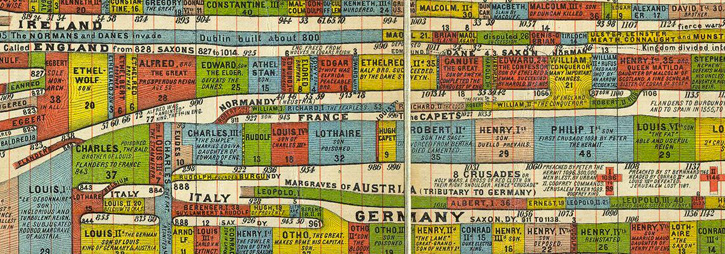
MA in History
The MA in History is a 12-month programme (24-months part-time).
It offers unique flexibility and diversity: four separate streams, eighteen modules, and an optional work placement. Streams range from Medieval and Renaissance History to Modern Ireland or Media and History or International and European History
You select from diverse topics, such as revolution and regime change, collective memory and commemoration, cultural heritage, the medieval world view, Ireland’s relationships and encounters with the wider world, identity, nationalism, the evolution of healthcare, radicalism and social unrest, the historical uses and applications of modern media, war and peace, booms and busts since the dawn of modern finance, contemporary history, US foreign relations or feminist history.
Students have the opportunity to:
- Examine the relationship between collective memory and identity and history.
- Critically appreciate the manipulation, uses and abuses of history.
- Investigate how history graduates contribute to numerous work environments.
- Interrogate old and new ways of doing history.
In addition, the MA in History provides the option of a work placement with a relevant host in the media, heritage, publishing business, private or public sectors to apply and enhance your skills. The thoughtful and inventive assessment mix will provoke and challenge you, and the internationally-respected faculty team will mentor you throughout the degree. Equip yourself with a sophisticated appreciation of history and its applications.
What will I study?
Part One (45 credits)
1. All students take 15 credits of the following compulsory modules:
- Making History Public (10 credits)
- Changing Directions in History: Transformative Historians and their Work (5 credits)
2. Students select 20 credits from one of the following streams:
| Medieval and Renaissance History |
Modern Ireland |
Media History |
European and International History |
| Historical Contexts for Medievilists (10 credits) |
Debates in the Irish Revolution (10 credits) |
Radicalism, Dissent and the Print Media in Modern Ireland (10 credits) |
US Foreign Policy and Contemporary History (10 credits) |
| The Insular World in Text and Image (10 credits) |
Healthcare in Ireland, 1750-present (10 credits) |
|
War and Peace: the European State System from 1648 to 1990 (10 credits) |
| The Classical Revival 1250-1500 (10 credits) |
|||
| New Worlds, Ancient Texts (10 credits) |
3. Finally, students choose an additional 10 credits from any module on the MA that they have not already selected or they may take the following
- HI6063 Work Placement and Portfolio (10 credits)
- Latin language modules (10 credits)
Part Two (45 credits)
- HI6100 Dissertation (45 credits)
Students work closely with an academic supervisor to complete a 20,000 word minor dissertation on a topic of their choosing within the broad area of history. There will be a series of workshops to facilitate students in selecting, researching and writing their dissertations.
Assessment
The MA is predominantly continuously assessed. A variety of assessment modes (e.g. long and short essays, literature reviews, proposals, blogs, web displays, radio archive analyses, treaty/document critiques, exhibitions, work placement portfolios, in-class assignments, oral presentations, producing a radio documentary, group project, etc.) cultivate a wide range of skills. The precise assessment mix is governed by module choice. One elective is assessed by a formal written examination.
You undertake independent research for your dissertation in close consultation with your supervisor. The 50% weighting for the dissertation reflects the importance attached to independent research.
People
Approximately fifteen faculty contribute and deliver this module but the core staff are:
- Dr John Borgonovo [Programme Coordinator]
- Dr John Borgonovo [Public History]
- Dr Damian Bracken & Dr Jason Harris [Medieval and Renaissance stream]
- Dr Donal Ó Drisceoil [Media stream]
- Dr Mervyn O’Driscoll [European and International; Modern Ireland streams]
Entry Requirements
To be considered for admission to the MA in History programme, an applicant will normally possess a primary degree result of Second Class Honours Grade 1 (2H1) primary degree (or equivalent) in History, or a cognate/suitable subject (normally in the Arts, Humanities, Social Sciences or Law). For North American students a cumulative GPA of 3.3 is normal.
Candidates who hold a primary degree in History or a cognate/suitable subject with a Second Class Honours Grade II (2H2) will also be considered (normally in the Arts, Humanities, Social Sciences or Law), as will those with a GPA between 2.7 and 3.2. These applicants will be requested to provide additional information, documentation, samples of work and/or be interviewed by a Selection Committee.
In exceptional circumstances, professional experience in a relevant and related field (e.g. working in publishing, journalism, the heritage industry, archives etc.) may be accepted as compensating for the absence of an undergraduate degree awarded at a grade lower than 2H2. Admission of such applicants will be subject to the approval of the College of Arts, Celtic Studies and Social Sciences.
All applicants whose first language is not English are required to sit either an IELTS test or a recognised equivalent test. The minimum requirement is an IELTS score of 6.5, with no individual section lower than 5.5. Further information on English language requirements can be found at http://www.ucc.ie/en/study/postgrad/how/
How to Apply
Application for this programme (CKE 44 full-time; CKD 24 part-time) is on-line through UCC's application system. Places on this programme are offered in rounds. The closing dates for each round can be found here. http://www.ucc.ie/en/study/postgrad/how/applicationclosingdates/
For full details of the application procedure click How to apply. [http://www.ucc.ie/en/study/postgrad/how/]
Please note you will be required to answer specific additional questions as part of the online applications process for this programme and provide a research proposal and writing sample.
The School of History may ask applicants to provide letters of reference when considering applications.
Before completing the online application, intending candidats must consult with the relevant course co-ordinator or prospective supervisor to discuss their proposed research area.
Early applications are encouraged for early decisions.
Further Contact Information
For more information, please contact:
Course Director:
Dr John Borgonovo
Email: j.borgonovo@ucc.ie
OR
School Administrator:
Email: history@ucc.ie
